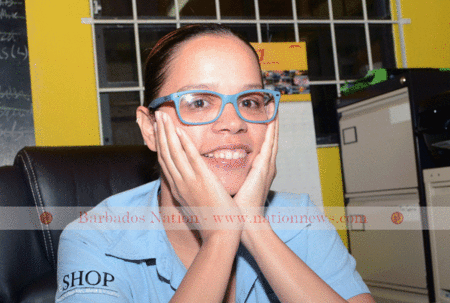 HER PHYSICAL APPEARANCE is not the first that comes to mind when you hear of the condition multiple sclerosis (MS).
HER PHYSICAL APPEARANCE is not the first that comes to mind when you hear of the condition multiple sclerosis (MS).
She looks like the typical young woman in her 20s going about her life, work, friends and other daily activities with no obvious physical disability. However, Hailli Hewitt was diagnosed with remitting relapsing multiple sclerosis in 2011 after having had her first attack in 2010. It started with blurred vision, but she thought nothing of it since she wore contact lenses. She went for a magnetic resonance imaging (MRI) scan but because of her braces, she did not have it at that time and her vision subsequently cleared up.
However, her first official attack was to come a year later.
To date the MS has only affected her eyes, albeit seriously, as at one point she was blind in both.
An office manager for the last eight years at her father’s business, Premium Seafoods, Hailli said that even before her diagnosis, she remembered as a child she always had the feeling of “pins and needles” all the time. Her grandmother’s advice was that she needed to drink more water.
 Hailli is office manager in her father’s Premium Seafoods business.
Hailli is office manager in her father’s Premium Seafoods business.
Growing up she lived a normal and carefree life, running around playing and engaging in sports. But with the onset of her vision problems, she realised that all was not right.
“I did not know what it was, I could not explain it, but I just knew something was wrong. I had one attack after that (2011) and I have been in remission ever since,” Hewitt said.
That attack caused a loss of sight, but thanks to the immediate medical care she received, it returned.
“I woke up and it was like this wax paper was covering my eyes; I just could not see. I went straight to the doctor [and] it did not last a week. My vision is okay; it never came back 100 per cent, but it is still good.”
On the day of her diagnosis, Hewitt recalled, there was plenty of anxiety, particularly for her relatives.
“My family took it a lot harder than me. I don’t think it has actually hit me as yet, because I cannot complain; I still am quite normal. Still out and about partying, doing whatever I can – it definitely has not stopped me,” she proudly proclaimed.
As a member of the MS Society of Barbados, she has met many people who have been affected by the illness and has realised there were many more than she thought.
She has taken to social media and created a Facebook page called MS In Barbados. There she shares the stories of people with the illness. There are also articles of what’s happening in the MS community worldwide. It is because of this forum that she has developed international friendships.
“The response has been phenomenal and there has been a lot of positive feedback helpful to people. When you are first diagnosed it can be very scary and depending on your personality, you can take it and kind of go into a state of depression. My family has been super supportive, so I never was able to go into that sad, woeful state.”
 Hailli Hewitt checking on supplies in the retail shop, which she runs.
Hailli Hewitt checking on supplies in the retail shop, which she runs.
As for her prognosis, the doctors are not sure what will happen next. “You really do not know; it is completely unpredictable and it affects everyone differently,” Hewitt said, while adding that medications worked for some people but not for others. In terms of medical treatment, she said Barbados was many years behind since it was still on injections, which she administers herself at times.
There are no pills through the Barbados Drug Service even though there are alternative treatments available. One of the challenges is the price of the medication, which can cost as much as $3 600 a month, which her parents had to buy after her diagnosis before they got assistance. “There are a lot of people out there who would like to get the medication . . . [but] to get to see the doctor at the QEH [Queen Elizabeth Hospital] is a whole day event.”
She said that unfortunately that for many MS sufferers there was no alternative but to try and cope with the multiple challenges on their journey. Despite her health challenges, Hewitt maintains a cheerful and positive disposition. Her diagnosis means she has had to change her diet, eating more fruits and uncooked vegetables. She also pays close attention to her eyes which she checks daily as soon as she wakes up.
She also tries to maintain a stress-free a lifestyle. Her daily routine includes office duties at the family business and she also runs the retail shop. “We usually do wholesale to hotels and restaurants but the shop allows people to come and purchase individual items. The shop is my little baby.
This Article is Compliments the Nation Newspaper
Author: lisaking@nationnews.com


 Ever heard the saying “it’s better to give than to receive” well that also applies to time. By volunteering we support an organization or cause and make a great difference in our communities. It’s also a great way to meet new people and learn about the challenges they face daily. Consider giving more than just money, give your time !
Ever heard the saying “it’s better to give than to receive” well that also applies to time. By volunteering we support an organization or cause and make a great difference in our communities. It’s also a great way to meet new people and learn about the challenges they face daily. Consider giving more than just money, give your time !

